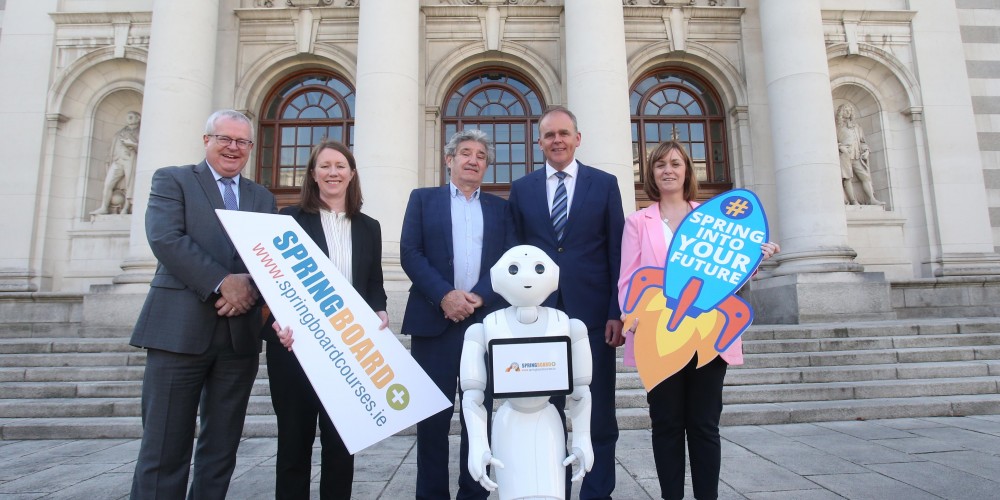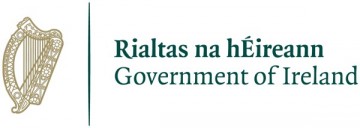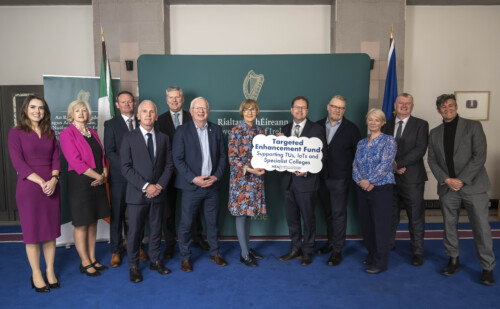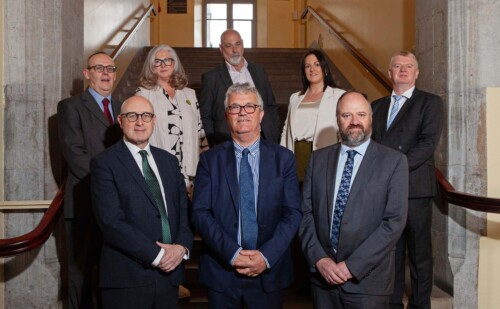
Government launches Springboard+ 2019
By Maura O'Shea
Posted: 15 May, 2019
More than 9,000 free or subsidised places on 285 upskilling and reskilling courses, with emphasis on importance of digital economy
90% of previous participants who were on the Live Register now in employment
The Minister for Education and Skills Joe McHugh T.D. and the Minister of State for Training, Skills Innovation, Research and Development John Halligan T.D. today launched a new suite of courses under Springboard+ 2019. This brings the number of courses to 285 and the number of places available from this academic year to over 9,000.
Government has identified four areas of critical importance: digital skills, soft skills, management and leadership and the workplace of the future. All courses address at least one of these areas in detail, with many including all four of the critical areas.
Many courses focus on future-proofing the skills of people already in employment, particularly in roles that may be impacted by digitalisation. This strategy is aligned with the priorities set by the National Skills Council and Future Jobs Ireland 2019.
Minister McHugh said: “Springboard+ training programmes provide people who are unemployed, those looking to return to the workforce and those in employment with a great opportunity to upskill or reskill in areas in which employers need skilled workers.
“As technology evolves, it brings with it new ways of doing business and new economic opportunities. The Government recognises that it is essential that people in employment have the opportunity to keep pace with these advances.”
Minister Halligan commented: “I am particularly pleased to see that almost 90% of the courses provided under Springboard+ 2019 will be delivered in a more flexible format, which aligns with the continued opening-up of courses to learners, irrespective of their employment status. As well as aiding participation for those in employment, increased provision will allow people from all across the country to access programmes in regions other than where they reside.”
Courses on offer through Springboard+ include cutting-edge training in blockchain, artificial intelligence, cybersecurity, virtual reality and smart factory technology. Employees, jobseekers and those returning to work can all avail of these free or subsidised courses.
Springboard+ courses are free for people who are unemployed, those who were previously self-employed and returners to the workforce. Courses are also free for people in employment, on NFQ Level 6 courses. For employed participants on courses NFQ level 7 – 9, 90% of the course fee is funded by the Government, with participants required to contribute just 10% of the fee.
Recent research undertaken by the HEA has shown that 90% of participants who were on the Live Register at the start of their courses are now in employment.
Since 2011 over €192m has been allocated to Springboard+, providing over 55,000 places. The Springboard+ programme is managed by the Higher Education Authority, on behalf of the Department of Education and Skills.
The 9,151 places on offer under Springboard+ 2019 represents an investment of €34.3m from the National Training Fund with co-funding from the European Union under the European Social Fund, as part of the ESF Programme for Employability, Inclusion and Learning 2014-2020.
Candidates who wish to participate in Springboard+ 2019 will find full details on the approved courses on the dedicated information and applications website www.springboardcourses.ie
ENDS
Note for Editors
Background to Springboard+
Springboard+, which is managed by the Higher Education Authority on behalf of the Department of Education and Skills, began in 2011 as part of the Government’s Jobs Initiative. It complements the core State-funded education and training system and provides free and heavily subsidised upskilling and reskilling higher education opportunities in areas of identified skills need. The initiative’s primary target group when it was established was unemployed people with a previous history of employment. Over recent years with the decline in numbers on the live register the focus was changed to include more people in employment and those returning to the workforce.
ICT skills Conversion Courses were introduced in 2012 as a means to address concerns by industry and the enterprise development agencies about continuing difficulties in sourcing ICT graduates with requisite skills.
Springboard+ courses are at Level 6 (Certificate) to Level 9 (Masters) on the National Framework of Qualifications (NFQ) and are delivered by public and private higher education providers around the country. Courses are not all a full award at each level – they may also be minor awards or special purposes awards. All courses provide job-readiness training and most offer the opportunity for work placement, project-based learning or industry site visits where appropriate.
All courses approved for funding under Springboard+ are selected by an independent panel with experts from industry and education following a competitive tendering process. In particular, courses with a proven track record in getting people back into employment are recommended for funding.
The majority of courses approved under Springboard+ 2019 commence in autumn 2019, however there are a number of courses that start later in 2019 and in early 2020. Full details on Springboard+ courses, the eligibility criteria and how to apply can be found on the website: www.springboardcourses.ie






